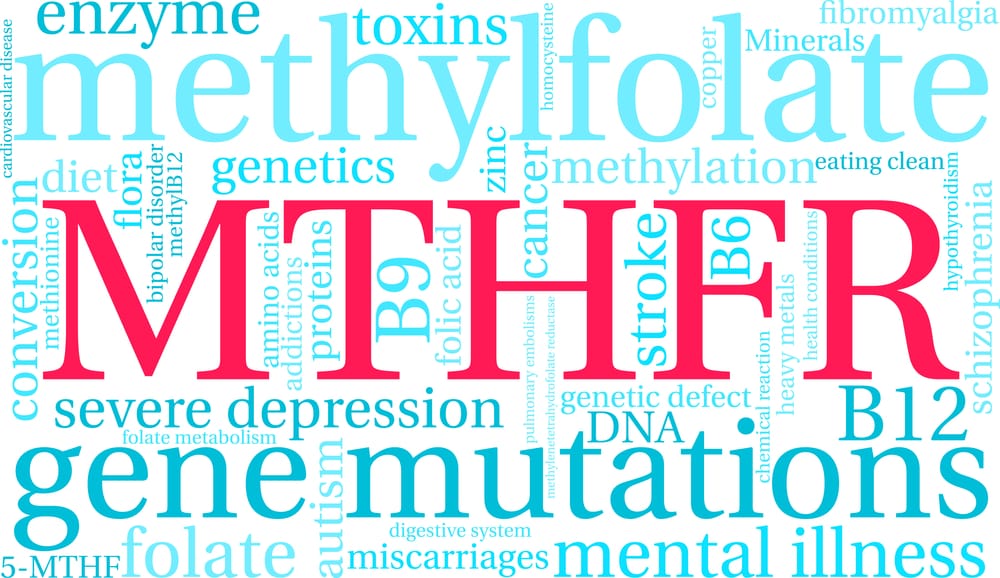Having an MTHFR mutation is not exactly something you would know about because not many people get tested for it at all. In many of our blogs, we described the MTHFR gene as an enzyme that converts the folate you eat from food into the active form – 5-Methyltetrahydrofolate. Having a mutation greatly affects how much folate your body will be able to metabolize and absorb.
More than folate absorption, the MTHFR gene is also heavily involved in the process of methylation which is responsible for converting homocysteine into methionine, a substance the body needs for proper metabolism and muscle growth and which is needed for glutathione creation. The process of methylation also involves the enzyme from the MTHFR gene, so those with a mutation may have trouble effectively eliminating toxins from the body. Buy MTHFR Test Kit
Building a lifestyle around the MTHFR gene
Those with a MTHFR gene mutation have a highly reduced ability to convert folic acid or even folate into a usable form. Research estimates that as much as half of the population may have an MTHFR gene mutation, though there are many variations of the mutation, depending on how the gene was passed down from the parents.
With that said, if you have an MTHFR mutation you would be doing your body a favor by having a lifestyle that caters to specifically for people diagnosed with a mutation in their MTHFR gene. Though it isn’t possible to change a gene, there are things that can be done to minimize the potential for problems or to help avoid problems in children.
Below are some diet tips as well as other helpful information on how to cope with an MTHFR mutation.
FREE Download What is MTHFR eBook
1. Focus on gut health
It is important to focus on gut health so that the body can absorb the nutrients from food as effectively as possible specially when you know your body is unable to use nutrients efficiently. Support your gut with fermented foods and homemade broth. Avoid vegetable oils, processed grains, refined sugars, and even antibacterial soaps.
2. Avoiding toxins in the environment
As mentioned, those with an MTHFR gene defect have an impaired ability to eliminate toxins. Avoid plastics, chemicals in beauty supplies and cleaning products. Even scented candles aren’t good for you since they release harmful chemicals in the air. When cleaning indoor air, use houseplants instead and make sure you filter your drinking and shower water too.
3. Not taking folic acid
Folic acid is the synthetic form of folate that cannot be used by those with a MTHFR defect and which can be very toxic.avoid any supplements with folic acid and only take L-MTHF forms, which are the methylated forms that my body can use. Also take a methyl-B12 which is supposed to help the body use L-MTHF.
4. Eating leafy greens
Dark leafy greens contain the methylated forms of folate that those with a gene defect need. As if we needed more reasons that it is important to consume green veggies. We’re talking about the likes of spinach, kale, bok choy, and Swiss chard. You don’t have to go at grass like a goat, just adding a small portion per meal is good enough.
5. Don’t eat processed foods, eat organic
Many processed foods have synthetic folic acid added as well as how they’re just not healthy for you. Eat hormone free, grass-fed meats, grass-fed butter or ghee, and organic free-range eggs. The key here is to eat something the way nature intended and not how large-scale factories want it.
6. Avoiding heavy metals
Heavy metals in diet or environment are harder to remove from the body for those with a gene defect. Remove mercury amalgams from a trained biological dentist. Avoid aluminum exposure in antiperspirants and cookware. Help remove toxins using liposomal glutathione.
7. Getting folate from natural sources
Nothing beats getting vitamins and minerals from food. According to NutritionData, the best sources of folate per 100 g serving are:
- Beans and lentils (~50% RDI)
- Raw spinach (49% RDI)
- Asparagus (37% RDI)
- Romaine (Cos) lettuce (34% RDI)
- Broccoli (27% RDI)
- Avocado (20% RDI)
- Oranges/Mangoes (~10% RDI)
Research show a folate-rich diet can match the homocysteine-lowering effects of either a regular folic acid or 5-MTHF supplement.
8. Get your homocysteine levels measured
Your body’s ability to convert homocysteine is impaired if you have an MTHFR mutation. If your homocysteine levels are abnormally elevated, it can result in an increased risk of heart attack and stroke. Cognitive impairment, mood disorders, congenital defects and pregnancy complications may all also be significant problems. High homocysteine levels also appear to be correlated with incidences of PCOS. No one agrees on an upper limit for safe homocysteine levels. 5-15 micro mols per liter is thought to be average, but that varies of course from person to person.
If your homocysteine levels are high, supplement with methylcobalamin, vitamin B2, vitamin B6, and of course, 5-MTHF.
9. Have a regular detox
Since your body’s ability to detox properly is impaired, you would be doing it a favor by initiating your own little detox routines. If you don’t detox and your body also has trouble detoxing, the body can become over-burdened by heavy metals such as copper, lead, or mercury, or by environmental toxins like BPA, or by normal body waste like excess estrogen.
Some detox regimens include infrared sauna sessions, Epsom salt baths, and regular exercise or sweating.
10. Supplement with essential nutrients
Nutrients from food are great but if you find yourself unable to procure food rich in nutrients you need then you really have to take something exogenous. Methyl-B12, methyl-folate, TMG, N-acetylcysteine, riboflavin, curcumin, fish oil, Vitamins C, D, E, and probiotics are excellent supplements your body will love more so if you have an MTHFR mutation.
A word of caution: if you are double homozygous for MTHFR mutations, you should advance carefully with methyl-B12 and methyl folate supplementation. Some patients with this type of mutation can’t tolerate high doses. Also, avoid taking high doses of niacin (vitamin B3), which can hinder methylation.
Watch Webinar: Vaccinations and MTHFR for Patients
Takeaway
Building a lifestyle around an MTHFR mutation isn’t really all that difficult as a large part of it is mainly about living a healthy lifestyle filled with a proper diet and a good amount of exercise. Granted those with MTHFR mutations need to be more careful around the use of synthetic substances and products as well as eat more of food that will help them detox and methylate but the adjustment only really looks hard on paper. Once you’re inclined to live a healthy life, these little tweaks aren’t really that much to think about. The key is consistency and awareness plus regular testing.









